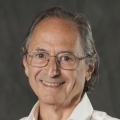[WEBCAST] Coronavirus Updates with with MICHAEL LEVITT, Nobel Laureate in Chemistry (Episode 2)
VIEW EVENT DETAILSEpisode 2: Conversation with MICHAEL LEVITT, Nobel Laureate in Chemistry
On January 30, the World Health Organization declared a global health emergency on the spread of the novel coronavirus (Covid-19) that originated in Wuhan, China. Healthcare experts have warned that Covid-19 could rapidly spread, if not properly contained, and many governments around the world have begun to take precautionary measures to ensure public health safety. Amid the international concern and heightened fears about the disease, what is fact and what is fiction? The Asia Society Hong Kong Center brings you regular updates on the coronavirus story in Hong Kong that has reverberations elsewhere in the world. We are pleased to present on-the-ground public health experts and internationally renowned specialists with the latest facts and evidence-based findings regarding this epidemic outbreak. In episode 2, hear from Prof. Michael Levitt, Nobel Laureate in Chemistry and Professor at Stanford School of Medicine. S. Alice Mong, Executive Director of Asia Society Hong Kong Center will moderate the discussion.
Got Questions? Submit any questions in advance or during the program.

Michael Levitt is Robert W. and Vivian K. Cahill Professor of Cancer Research in the Structural Biology Department at Stanford School of Medicine. He holds a courtesy appointment in the Department of Computer Science, and is founding member of BioX that brings together experts in biology, medicine, chemistry, physics and engineering. Before moving to Stanford’s Department of Structural Biology in 1987, Prof. Levitt held academic positions in the Laboratory of Molecular Biology in Cambridge (1972-1979) and Department of Chemical Physics at the Weizmann Institute (1980-1987). He has been a member of the Royal Society since 2001 and U.S. National Academy of Science since 2002. As one of the first computational biologists, Prof. Levitt has major contributions in four areas: multi-scale methodology, analysis of protein and nucleic acid structure, molecular dynamics and ab initio protein folding. His interactions with experimentalists lead to the Jack-Levitt method for refining coordinates against X-ray data. In structural analysis, he co-discovered the four protein fold classes and the packing geometry of secondary structure segments. Prof. Levitt’s early calculations of energies and forces paved the way for protein molecular dynamics simulations, leading to realistic simulations in solution and a widely adopted approach to protein unfolding. In 2013, he received the Nobel Prize in Chemistry, along with Martin Karplus of the University of Strasbourg in France and Harvard University, and Arieh Warshel of the University of Southern California.
Latest research by Prof. Levitt
"Analysis of COVID-2019 Data on 2/23/2020” by Michael Levitt, Stanford University, USA
Contrary to the prevailing world hysteria, the COVID-19 epidemic is almost all over in China and likely also in the whole world. Today’s analysis uses WHO data for the past 32 days to confirm trends we have shown in the 22 earlier reports. We separate Hubei from non-Hubei as most cases and deaths have occurred in Hubei (see Fig. 2). We estimate there will be 3,050 Total Hubei Deaths and less than 200 non-Hubei Deaths in China. There will be 65,000 Hubei Cases with a Hubei Death Rate of 4.5% (1% on Day 0 after becoming a case; 2.4% on Days 8 & 9, the remaining 1% after day 14). There will be 15,000 non-Hubei Cases in China with a death rate currently of 1%. We also analyze the mini-epidemic on the Diamond Princess cruise ship as a test scenario for the world.
